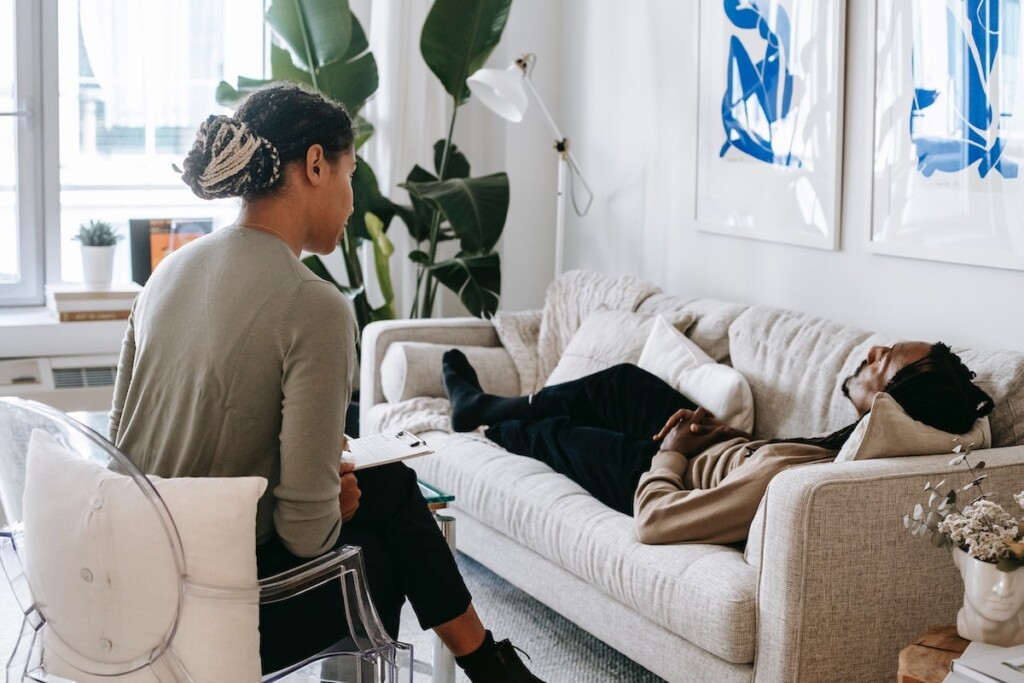
The first time I spoke with a therapist, I was 11 years old. My parents divorced when I was 10, and based on my intense anger and depression, they thought it a good idea that I speak to someone. At the time, I wanted no part of talking to a stranger about my feelings. I was a child and now — after years and years of therapy — I realize I felt unsafe. My trust had been broken by those I’d trusted most. I was unprepared and ill-equipped to let someone in, no matter how qualified. Shortly after this experience I began drinking at 12 years old and didn’t step foot in another therapist’s office until I stopped, 15 years later.
The willingness to heal
When I finally knew I was serious about getting sober, my dad offered to help me get a therapist who specializes in addiction. This was the first time I’d ever willingly met with a therapist, aside from the school guidance counselor I’d visit anytime I was feeling anxious or blue. The therapist and I met a handful of times. She was kind, and we addressed the deep-rooted anger I had towards my mother, which I’d never expressed in words to anyone before. She had me handwrite a letter of everything I wanted to say to my mom. It took days to get it all down, crying to the point of dry-heaving, until my next therapy session when I read it aloud. My therapist told me she was proud of me and that this was the beginning of my healing, but continued on to tell me that she could do no more for my alcoholism. We’d done what we could and it was time for me to go to a 12-step program.
The next big obstacle I came upon was three years into my recovery. I had been struggling with my relationships with men, my understanding of my own sexuality—actually, my understanding of what “‘sexuality” even meant—there was a lot to unpack. At the advice of a wise sponsor, I sought therapy to aid in these new challenges that laid before me. Finding an affordable therapist proved difficult, so I ended up entering into group therapy for the first time which turned out to be the perfect fit. There, in that small room on Tuesday evenings in midtown Manhattan, I could practice vocalizing my thoughts, feelings, wants, fears, and boundaries in real time as they related to others in the room—even men.. It was a place to explore and learn what made me feel safe, what didn’t, and how to love and respect myself enough to honor those emotional borders.
Turns out, my stint in group therapy helped me develop relational skills for building healthy connections with men—the next time I sought the care and guidance of a therapist, I had just started seriously dating the man who would later become my husband. It was my first (and only!) serious relationship in recovery, and I was also on shaky ground with my career, and still had more mom-related issues to unpack. There were new areas of positive growth and old wounds that still needed healing; as recovery progresses, so does life.
There’s always more work to be done
My career issues stemmed from my taking a leap of faith. I left steady, soul-draining work to bet on myself and become a professional writer. My romantic inquiries weren’t “issues” or “problems” to work out, rather new territory I wasn’t well-practiced in how to navigate. Therapy isn’t always a place to go when things are breaking down, in fact, I’ve found it’s one of the greatest places to go when new foundations are building up. My then-therapist saw me through achieving every milestone on my journey to becoming a full-time writer, and celebrated every step taken from long-distance dating to walking down the aisle towards my now-husband.
Currently, I’m working with a bold, talented trauma therapist for symptoms of PTSD. She’s well-versed and practiced in art therapy and EMDR, two modalities that are ramping my life up at lightning speed. The truth is there are always new levels to explore, depths of humanity to discover, and sometimes, it’s simply invaluable to have an unbiased, trained listener invested in your own well-being. I also work with a psychiatrist for continued mental health care for anxiety and OCD.
Throughout my bouts in and out of therapy over the last nine years, I’ve felt unbelievably lucky to be able to get the support I’ve needed. It’s often uncomfortable and there have been more times than I can count when I didn’t want to go to a session, and afterwards, felt so glad that I did. I’ve found that the key to therapy is finding someone you trust; healing and self-discovery require honesty and vulnerability. I also recommend trying different modalities. As mentioned, I’ve engaged in multiple styles of therapy, including Cognitive Behavioral Therapy, art therapy, EMDR (eye movement desensitization and reprocessing), group therapy, talk therapy, and pharmaceutical intervention. There is no shame in seeking mental health care—in fact, I’m proud of the person I’ve become because of the prioritization I’ve given my mental well-being.
Ways to find accessible outside help
Unfortunately, therapy isn’t always accessible to everyone who needs it, due to financial and sociopolitical reasons. Be sure to ask your primary care office if they have mental health services; during the quarantine in 2020, I was able to have virtual sessions with a social worker via my primary care office. Also, your place of work may have mental health offerings—check with HR to learn more.
To help make therapy more accessible to all, below are some helpful resources in case you or someone you know need to reach out, and may need a little extra assistance getting needed—and deserved— mental health services:
Talkiatry: In-network online psychiatry
Latinx Therapists Action Network
Black Emotional and Mental Health Collective
National Queer and Trans Therapists of Color Network
Suicide Crisis Hotline: Call 988
Crisis Text Line: Text “HOME” to 741741 –
What to Expect When Calling a Helpline

Pam Stepansky is a Jewish American writer, humorist, and self-care enthusiast who is passionate about recovery, philosophy, and what it means to be human. She resides in Wayne PA with her partner, Adam, and their spirited tuxedo cat, Gumbo
